Zeyu Cui
additional authors not shown
SWE-Flow: Synthesizing Software Engineering Data in a Test-Driven Manner
Jun 11, 2025Abstract:We introduce **SWE-Flow**, a novel data synthesis framework grounded in Test-Driven Development (TDD). Unlike existing software engineering data that rely on human-submitted issues, **SWE-Flow** automatically infers incremental development steps directly from unit tests, which inherently encapsulate high-level requirements. The core of **SWE-Flow** is the construction of a Runtime Dependency Graph (RDG), which precisely captures function interactions, enabling the generation of a structured, step-by-step *development schedule*. At each step, **SWE-Flow** produces a partial codebase, the corresponding unit tests, and the necessary code modifications, resulting in fully verifiable TDD tasks. With this approach, we generated 16,061 training instances and 2,020 test instances from real-world GitHub projects, creating the **SWE-Flow-Eval** benchmark. Our experiments show that fine-tuning open model on this dataset significantly improves performance in TDD-based coding. To facilitate further research, we release all code, datasets, models, and Docker images at [Github](https://github.com/Hambaobao/SWE-Flow).
Parallel Scaling Law for Language Models
May 15, 2025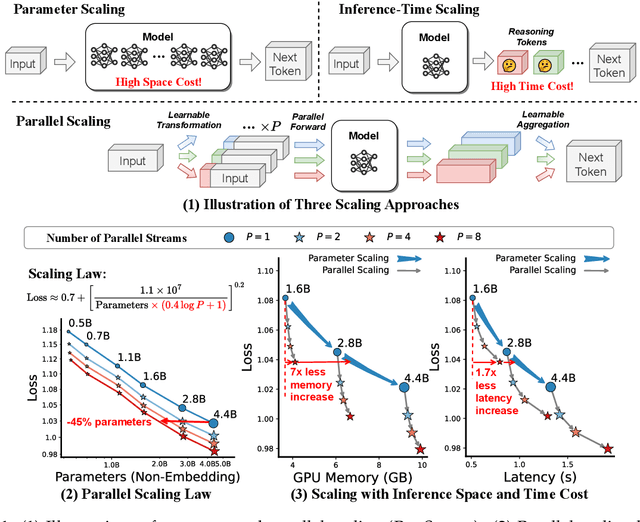

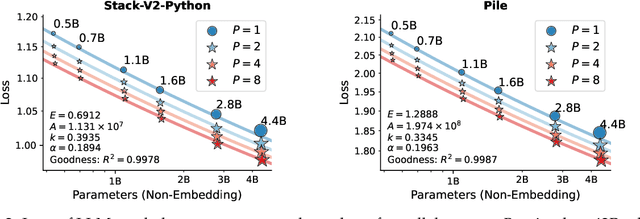

Abstract:It is commonly believed that scaling language models should commit a significant space or time cost, by increasing the parameters (parameter scaling) or output tokens (inference-time scaling). We introduce the third and more inference-efficient scaling paradigm: increasing the model's parallel computation during both training and inference time. We apply $P$ diverse and learnable transformations to the input, execute forward passes of the model in parallel, and dynamically aggregate the $P$ outputs. This method, namely parallel scaling (ParScale), scales parallel computation by reusing existing parameters and can be applied to any model structure, optimization procedure, data, or task. We theoretically propose a new scaling law and validate it through large-scale pre-training, which shows that a model with $P$ parallel streams is similar to scaling the parameters by $O(\log P)$ while showing superior inference efficiency. For example, ParScale can use up to 22$\times$ less memory increase and 6$\times$ less latency increase compared to parameter scaling that achieves the same performance improvement. It can also recycle an off-the-shelf pre-trained model into a parallelly scaled one by post-training on a small amount of tokens, further reducing the training budget. The new scaling law we discovered potentially facilitates the deployment of more powerful models in low-resource scenarios, and provides an alternative perspective for the role of computation in machine learning.
Qwen3 Technical Report
May 14, 2025
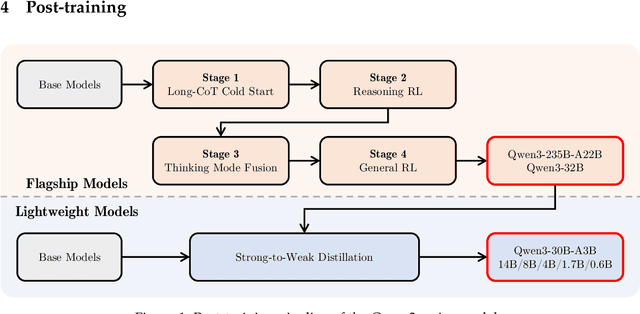

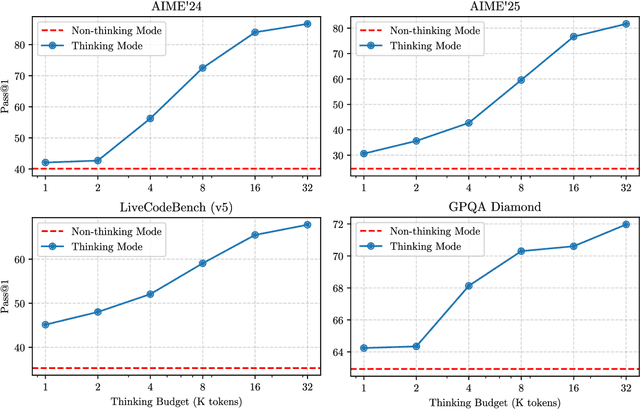
Abstract:In this work, we present Qwen3, the latest version of the Qwen model family. Qwen3 comprises a series of large language models (LLMs) designed to advance performance, efficiency, and multilingual capabilities. The Qwen3 series includes models of both dense and Mixture-of-Expert (MoE) architectures, with parameter scales ranging from 0.6 to 235 billion. A key innovation in Qwen3 is the integration of thinking mode (for complex, multi-step reasoning) and non-thinking mode (for rapid, context-driven responses) into a unified framework. This eliminates the need to switch between different models--such as chat-optimized models (e.g., GPT-4o) and dedicated reasoning models (e.g., QwQ-32B)--and enables dynamic mode switching based on user queries or chat templates. Meanwhile, Qwen3 introduces a thinking budget mechanism, allowing users to allocate computational resources adaptively during inference, thereby balancing latency and performance based on task complexity. Moreover, by leveraging the knowledge from the flagship models, we significantly reduce the computational resources required to build smaller-scale models, while ensuring their highly competitive performance. Empirical evaluations demonstrate that Qwen3 achieves state-of-the-art results across diverse benchmarks, including tasks in code generation, mathematical reasoning, agent tasks, etc., competitive against larger MoE models and proprietary models. Compared to its predecessor Qwen2.5, Qwen3 expands multilingual support from 29 to 119 languages and dialects, enhancing global accessibility through improved cross-lingual understanding and generation capabilities. To facilitate reproducibility and community-driven research and development, all Qwen3 models are publicly accessible under Apache 2.0.
NTR-Gaussian: Nighttime Dynamic Thermal Reconstruction with 4D Gaussian Splatting Based on Thermodynamics
Mar 05, 2025Abstract:Thermal infrared imaging offers the advantage of all-weather capability, enabling non-intrusive measurement of an object's surface temperature. Consequently, thermal infrared images are employed to reconstruct 3D models that accurately reflect the temperature distribution of a scene, aiding in applications such as building monitoring and energy management. However, existing approaches predominantly focus on static 3D reconstruction for a single time period, overlooking the impact of environmental factors on thermal radiation and failing to predict or analyze temperature variations over time. To address these challenges, we propose the NTR-Gaussian method, which treats temperature as a form of thermal radiation, incorporating elements like convective heat transfer and radiative heat dissipation. Our approach utilizes neural networks to predict thermodynamic parameters such as emissivity, convective heat transfer coefficient, and heat capacity. By integrating these predictions, we can accurately forecast thermal temperatures at various times throughout a nighttime scene. Furthermore, we introduce a dynamic dataset specifically for nighttime thermal imagery. Extensive experiments and evaluations demonstrate that NTR-Gaussian significantly outperforms comparison methods in thermal reconstruction, achieving a predicted temperature error within 1 degree Celsius.
Multi-Agent Collaboration for Multilingual Code Instruction Tuning
Feb 11, 2025Abstract:Recent advancement in code understanding and generation demonstrates that code LLMs fine-tuned on a high-quality instruction dataset can gain powerful capabilities to address wide-ranging code-related tasks. However, most previous existing methods mainly view each programming language in isolation and ignore the knowledge transfer among different programming languages. To bridge the gap among different programming languages, we introduce a novel multi-agent collaboration framework to enhance multilingual instruction tuning for code LLMs, where multiple language-specific intelligent agent components with generation memory work together to transfer knowledge from one language to another efficiently and effectively. Specifically, we first generate the language-specific instruction data from the code snippets and then provide the generated data as the seed data for language-specific agents. Multiple language-specific agents discuss and collaborate to formulate a new instruction and its corresponding solution (A new programming language or existing programming language), To further encourage the cross-lingual transfer, each agent stores its generation history as memory and then summarizes its merits and faults. Finally, the high-quality multilingual instruction data is used to encourage knowledge transfer among different programming languages to train Qwen2.5-xCoder. Experimental results on multilingual programming benchmarks demonstrate the superior performance of Qwen2.5-xCoder in sharing common knowledge, highlighting its potential to reduce the cross-lingual gap.
CodeElo: Benchmarking Competition-level Code Generation of LLMs with Human-comparable Elo Ratings
Jan 03, 2025Abstract:With the increasing code reasoning capabilities of existing large language models (LLMs) and breakthroughs in reasoning models like OpenAI o1 and o3, there is a growing need to develop more challenging and comprehensive benchmarks that effectively test their sophisticated competition-level coding abilities. Existing benchmarks, like LiveCodeBench and USACO, fall short due to the unavailability of private test cases, lack of support for special judges, and misaligned execution environments. To bridge this gap, we introduce CodeElo, a standardized competition-level code generation benchmark that effectively addresses all these challenges for the first time. CodeElo benchmark is mainly based on the official CodeForces platform and tries to align with the platform as much as possible. We compile the recent six months of contest problems on CodeForces with detailed information such as contest divisions, problem difficulty ratings, and problem algorithm tags. We introduce a unique judging method in which problems are submitted directly to the platform and develop a reliable Elo rating calculation system that aligns with the platform and is comparable with human participants but has lower variance. By testing on our CodeElo, we provide the Elo ratings of 30 existing popular open-source and 3 proprietary LLMs for the first time. The results show that o1-mini and QwQ-32B-Preview stand out significantly, achieving Elo ratings of 1578 and 1261, respectively, while other models struggle even with the easiest problems, placing in the lowest 25 percent among all human participants. Detailed analysis experiments are also conducted to provide insights into performance across algorithms and comparisons between using C++ and Python, which can suggest directions for future studies.
Qwen2.5 Technical Report
Dec 19, 2024

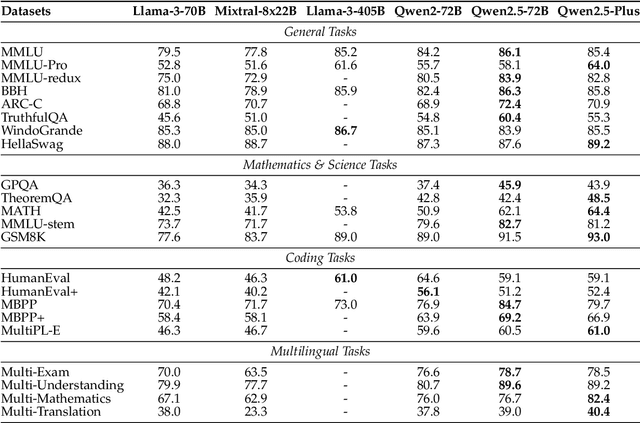
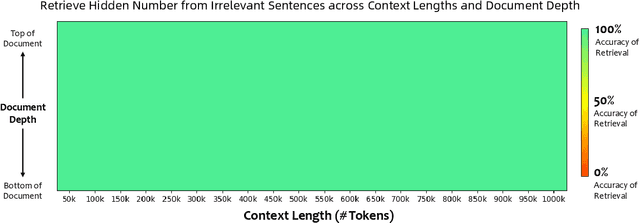
Abstract:In this report, we introduce Qwen2.5, a comprehensive series of large language models (LLMs) designed to meet diverse needs. Compared to previous iterations, Qwen 2.5 has been significantly improved during both the pre-training and post-training stages. In terms of pre-training, we have scaled the high-quality pre-training datasets from the previous 7 trillion tokens to 18 trillion tokens. This provides a strong foundation for common sense, expert knowledge, and reasoning capabilities. In terms of post-training, we implement intricate supervised finetuning with over 1 million samples, as well as multistage reinforcement learning. Post-training techniques enhance human preference, and notably improve long text generation, structural data analysis, and instruction following. To handle diverse and varied use cases effectively, we present Qwen2.5 LLM series in rich sizes. Open-weight offerings include base and instruction-tuned models, with quantized versions available. In addition, for hosted solutions, the proprietary models currently include two mixture-of-experts (MoE) variants: Qwen2.5-Turbo and Qwen2.5-Plus, both available from Alibaba Cloud Model Studio. Qwen2.5 has demonstrated top-tier performance on a wide range of benchmarks evaluating language understanding, reasoning, mathematics, coding, human preference alignment, etc. Specifically, the open-weight flagship Qwen2.5-72B-Instruct outperforms a number of open and proprietary models and demonstrates competitive performance to the state-of-the-art open-weight model, Llama-3-405B-Instruct, which is around 5 times larger. Qwen2.5-Turbo and Qwen2.5-Plus offer superior cost-effectiveness while performing competitively against GPT-4o-mini and GPT-4o respectively. Additionally, as the foundation, Qwen2.5 models have been instrumental in training specialized models such as Qwen2.5-Math, Qwen2.5-Coder, QwQ, and multimodal models.
ExecRepoBench: Multi-level Executable Code Completion Evaluation
Dec 16, 2024



Abstract:Code completion has become an essential tool for daily software development. Existing evaluation benchmarks often employ static methods that do not fully capture the dynamic nature of real-world coding environments and face significant challenges, including limited context length, reliance on superficial evaluation metrics, and potential overfitting to training datasets. In this work, we introduce a novel framework for enhancing code completion in software development through the creation of a repository-level benchmark ExecRepoBench and the instruction corpora Repo-Instruct, aim at improving the functionality of open-source large language models (LLMs) in real-world coding scenarios that involve complex interdependencies across multiple files. ExecRepoBench includes 1.2K samples from active Python repositories. Plus, we present a multi-level grammar-based completion methodology conditioned on the abstract syntax tree to mask code fragments at various logical units (e.g. statements, expressions, and functions). Then, we fine-tune the open-source LLM with 7B parameters on Repo-Instruct to produce a strong code completion baseline model Qwen2.5-Coder-Instruct-C based on the open-source model. Qwen2.5-Coder-Instruct-C is rigorously evaluated against existing benchmarks, including MultiPL-E and ExecRepoBench, which consistently outperforms prior baselines across all programming languages. The deployment of \ourmethod{} can be used as a high-performance, local service for programming development\footnote{\url{https://execrepobench.github.io/}}.
Evaluating and Aligning CodeLLMs on Human Preference
Dec 06, 2024



Abstract:Code large language models (codeLLMs) have made significant strides in code generation. Most previous code-related benchmarks, which consist of various programming exercises along with the corresponding test cases, are used as a common measure to evaluate the performance and capabilities of code LLMs. However, the current code LLMs focus on synthesizing the correct code snippet, ignoring the alignment with human preferences, where the query should be sampled from the practical application scenarios and the model-generated responses should satisfy the human preference. To bridge the gap between the model-generated response and human preference, we present a rigorous human-curated benchmark CodeArena to emulate the complexity and diversity of real-world coding tasks, where 397 high-quality samples spanning 40 categories and 44 programming languages, carefully curated from user queries. Further, we propose a diverse synthetic instruction corpus SynCode-Instruct (nearly 20B tokens) by scaling instructions from the website to verify the effectiveness of the large-scale synthetic instruction fine-tuning, where Qwen2.5-SynCoder totally trained on synthetic instruction data can achieve top-tier performance of open-source code LLMs. The results find performance differences between execution-based benchmarks and CodeArena. Our systematic experiments of CodeArena on 40+ LLMs reveal a notable performance gap between open SOTA code LLMs (e.g. Qwen2.5-Coder) and proprietary LLMs (e.g., OpenAI o1), underscoring the importance of the human preference alignment.\footnote{\url{https://codearenaeval.github.io/ }}
Enhancing LLMs for Power System Simulations: A Feedback-driven Multi-agent Framework
Nov 21, 2024Abstract:The integration of experimental technologies with large language models (LLMs) is transforming scientific research, positioning AI as a versatile research assistant rather than a mere problem-solving tool. In the field of power systems, however, managing simulations -- one of the essential experimental technologies -- remains a challenge for LLMs due to their limited domain-specific knowledge, restricted reasoning capabilities, and imprecise handling of simulation parameters. To address these limitations, we propose a feedback-driven, multi-agent framework that incorporates three proposed modules: an enhanced retrieval-augmented generation (RAG) module, an improved reasoning module, and a dynamic environmental acting module with an error-feedback mechanism. Validated on 69 diverse tasks from Daline and MATPOWER, this framework achieves success rates of 93.13% and 96.85%, respectively, significantly outperforming the latest LLMs (ChatGPT 4o and o1-preview), which achieved a 27.77% success rate on standard simulation tasks and 0% on complex tasks. Additionally, our framework also supports rapid, cost-effective task execution, completing each simulation in approximately 30 seconds at an average cost of 0.014 USD for tokens. Overall, this adaptable framework lays a foundation for developing intelligent LLM-based assistants for human researchers, facilitating power system research and beyond.
 Add to Chrome
Add to Chrome Add to Firefox
Add to Firefox Add to Edge
Add to Edge